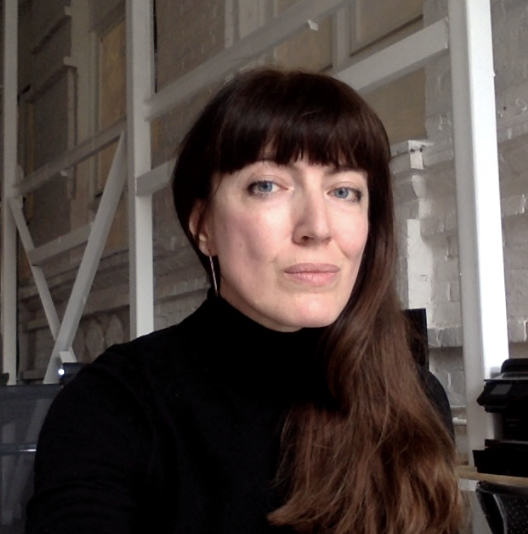New professors for Architectural design as of 1.10.: Anastassia Smirnova-Berlin und Alexander Sverdlov
We warmly welcome Anastassia Smirnova-Berlin und Alexander Sverdlov (Univ.prof. § 99 Architectural Design (platform Geography Landscapes Cities) at the Institute for Art and Architecture) to the Academy of Fine Arts Vienna! The department is co-chaired by both of them.

Anastassia Smirnova-Berlin is a designer and researcher based in Rotterdam, the Netherlands. Scenographer by education and a graduate of the Art Theatre School in Moscow, she has been part of many multidisciplinary projects and her competencies range from design and writing to curatorial. As a co-founder of the SVESMI office for architecture, urbanism and eduction, she leads various preservation initiatives within this team and is responsible for educational and cultural programming.
Throughout her career, Anastassia worked as a freelance author, writing about art, architecture and urbanism for the publications such as Content, Volume, Mousse, MONU, and Archifutures. In 2007, she joined AMO, a think tank within the Office for Metropolitan Architecture as a designer and editor.
In 2010, she also became part of the faculty at the Strelka Institute for Media, Architecture and Design alongside the OMA team and David Erixon (Hyper Island). With the latter she directed the Institute’s education program in 2012–2015, combining research activities and teaching with experimental development of innovative learning circuits. During those years, preservation and re-interpretation of the existing contexts remained the main focus of her research.
In 2016, Anastassia Smirnova-Berlin was appointed an academic director of the international multidisciplinary MA program Advanced Urban Design at the Graduate School of Urbanism (Research University Higher School of Economics) which focused on conceptual project making for transitional economies and high velocity urban environments in developing countries. She was the first woman to lead the international masters in the field of urban design in the CIS countries.
In 2018-2020, she taught at the Academies of Architecture in Amsterdam and Rotterdam, while also serving on the advisory board for the European Future Architecture platform, an association of architectural institutions, in 2018-2021.
During the same period, Anastassia curated and co-designed such exhibitions as The Meeting Point, The Big Future, and Future Architecture Rooms. In 2022, Anastassia and SVESMI curated a large-scale exhibition Visionaries and edited the associated publication Visionaries. Notes on Systemic Change for the Lisbon Architecture Triennial TERRA, addressing the issue of authorship in contemporary architecture.
In the last decade, Anastassia Smirnova was also an invited critic, lecturer, and jury member for various studios at the TU Delft, KTH Royal Institute of Technology Stockholm, ETH Zurich, the TU Darmstadt, and the Architecture Association London.

Alexander Sverdlov is an architect with 24 years of professional experience in design and construction based in Rotterdam, the Netherlands.
After graduating from the Berlage Institute in 2002, he joined Neutelings Riedijk Architecten (Rotterdam) to work as an architect and project leader for architectural and masterplanning competitions. His work is featured in major exhibitions and publications of this office.
In 2003-2004, he worked at OMA/AMO (Rotterdam) and led the Hermitage Museum extension. Later on, he continued his career at WEST 8 (Rotterdam) as a project architect for several award winning international projects, including the famous Park Lineal in Madrid.
Alexander co-founded SVESMI office for architecture, urbanism and education in 2007, while working as a project architect at de Architekten Cie (Amsterdam).
In 2009, he was invited by Winy Maas (MVRDV) to join the core team of tutors and curators at the Why Factory, a global think-tank and a research institute for the future city, at the Delft Technical University. During his 3-year stint in this position, Alexander led multiple innovative studios and helped forming the pedagogical platform of the institute. He also oversaw such research trajectories as Visionary Cities, Vertical Village, Absolute Leisure, and Porocity and co-authored seminal publications within the Why Factory series.
At SVESMI, Alexander strategically focuses on socio-cultural networks that originated in the twentieth century welfare states on both sides of the former iron curtain: from the systems of public libraries and schools to the structures of elderly care - and works on their active re-interpretation. Throughout his career he developed new models for typical schools, district cultural centres, social housing, and branch libraries, finding solutions to reform obsolete urban structures and strategising the way out of past cul-de-sacs. Under his leadership SVESMI gained international recognition as an experimental, multidisciplinary and research-based practice.
In the recent years, he was also a critic, lecturer and jury member for various studios at the Venice Art Academy, Aarhus School of Architecture, the TU Delft, the State Groningen University and the Berlage Institute.